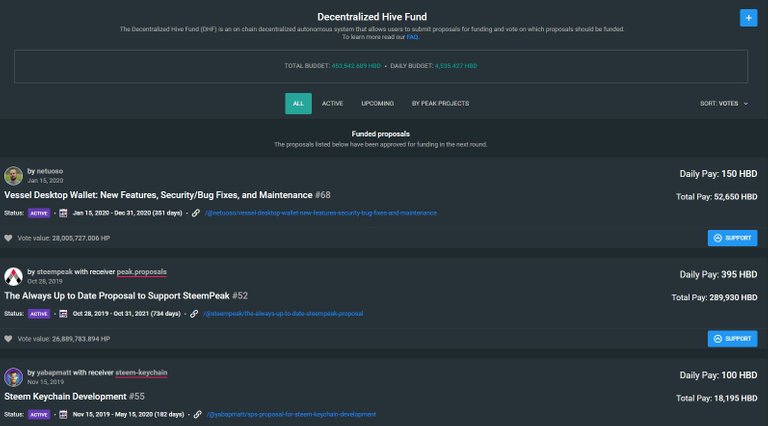Decentralized Hive Fund
The Decentralized Hive Fund (DHF) is an on chain decentralized autonomous system that allows users to submit proposals for funding and vote on which proposals should be funded.

I wanted to understand this a little bit more from a common person's point of view. Recently I have been asked to vote for a number of proposals, and I wanted to do it in a responsible manner. Therefore I went ahead and did some research, and that is where I start to get confused. So I asked a whole bunch of developers, as most of these are blockchain or web development projects, and I got a variety of 'opinion'. So I decided to write this post so that I can ask this questions a bit formally, and YOU the DEVELOPERS will be so kind to help me and the community understand a few things:
What is a Proposal and Where to Look for it
A proposal is a work plan which is set up by an individual or a group to do some kind of blockchain tool, productivity, trouble-shooting applications that will benefit the hive blockchain or the community. The easiest place to look for the existing proposal is peakd wallet, however there are many other ways to looks them up. When I click on that link above, this is where I land, as below:

What are the basics
On the landing page, proposals are simply a list based on community vote, with highest voted proposal at the top. Now comes one of the important part: The Return Proposal. I request every person to read it because it is very simple to understand, although @gtg should update it for Hive, but just a find-and-replace operation from steem to hive likely do the trick! In a single sentence:
Every proposal with less votes will not receive funds.
Therefore, the importance of return proposal is paramount. It does not cost the community anything, but it acts as a line that separates the funded and un-funded proposal. That is all a common person need to know about the Return Proposal.
How can the Return Proposal be used
- If an individual thinks that a particular proposal does not merit funding he/she should vote the Return proposal
- If an individual thinks that a particular proposal requires more clarity or over funded, he/she should vote the Return proposal
- later, when the other proposal becomes clear in a person's mind, he/she can unvote the Return proposal and vote the one he/she likes to support
- Voting requires active key (using hivechain or hiveconnect)
Now can we talking about funding?
Alright, this is where I need the help from the dev community at Hive. So please comment and help me and the rest of the non-technical community with your opinions. I have no good way to judge what is a "right level of funding" for a given proposal. So I asked around, discretely, to a few developers I know and I got three end-member answers, which I will list below:
- Most proposals currently on DHF are too expensive!
- Most proposals currently on DHF are just about right, and perhaps even on the low end.
- Closed source proposals are expensive, open-source ones are properly valued as anyone in the community can use them
As you can see, these perhaps cover all possible outcomes. So how do I judge? I can simply see that:
- Funding anyx.io API Infrastructure Recurrent Costs #36 is a modest one at only 15 HBD/day; I read it and sounds very reasonable to me (I didn't vote it, it’s already funded, but I should if it drops)
- Global Blacklist API #42 is also a modest one at only 20 HBD/day; I read it, I support it from my steem days
- On-going Hive chain development; new features, testing, and developer support #80 an expensive one at 275 HBD/day; I voted for it when it was below the line, now it is above the line. Not sure if that is the right level of funding (especially considering the developer has another project which is currently funded by the community. I support it, but asking for a feedback.
- No-Brainer SBD Potato Top Up Proposal #66 Why we need this here? Are you going to re-write it? It is currently funded!
Please understand; that I am just trying to learn appropriate cost to a particular project, not trying to single out any individual or project. My thought process is two fold:
- This is community funding, so we should be responsible; what is a right level of funding?
- Can less known developers (blockchain or web app) work with more experience ones at a cheaper cost? As an outsource model.
Personally I manage projects for a large Fortune 500 corporation, and I outsource projects all the time, for better performance and cheaper cost. Can't we do that for our blockchain? Why development work need to be centralized? :)
I am going to tag a few developers I know, I don't know a whole lot of you, so please don't feel that I am ignoring, I want to give your opinion equal weight too, so please feel free to comment and educate us.
@pharesim
@themarkymark
@gtg
@netuoso
@reazuliqbal
You all have very different background, and I think I can use your opionion.
Many thanks!

I'm sure that in some of the proposals there is clear time/materials costing but perhaps a template (there could be one) could be used so that each proposal can be cost-evaluated against another.
Yes, something like that will be helpful
I think there can be a rebalancing of proposals as new ones are put forth. Where something may be expensive now, I would rebalance my votes to something more reasonable in future. Hopefully with enough people doing this and being diligent about their proposal votes, we can foster some degree of competition for this limited resource.
You are a developer yourself, albeit on the network side, so I value your opinion a lot, it is difficult for me to understand the optimal cost for a project. Also it is difficult; because the cost of the same project in US or western Europe will be different from the cost of the same in the South East Asia for example, where we outsource most of our IT projects.
I'm not sure what a good blockchain developer bills out at, but a consulting firm will bill out a software-defined network engineer for between $200-300/hr. An independent consultant can usually ask for between $100-200/hr. It would actually make a great deal more sense to me if a percentage of the amount were paid out in HIVE, rather than HBD, so that contributors can also participate in the growth of the platform. Unless by fluke, HBD has no greater future expected value. That being said, they could also convert their awarded HBD at any time. In any case, I'm not looking through the proposals thinking anybody is vastly overpaid from a USD perspective, especially if they are delivering more value. Like I stated before, I'd be more inclined to create competition. Part of that will be having a way to actually measure progress, so we the voters can make informed decisions about which proposals to vote, unvote, and demand modification of.
You mean HBD, correct? Not SBD. :)
Fixed!
PS
Can the potato shit get unvoted already?
I raise the question. SBD has no meaning for Hive anymore. HBD is close to $1. So even the hive modified project is perhaps questionable. Regardless the proposal need to be modified and people need to remove their vote if it is not modified.
What happens to steem.dao fund? Can it be used for supporting dapp eco system?
Steem is a different blockchain. Not this one.
The dao is still using the account name steem.dao, this is a temporary problem until it can be resolved in a future hard fork.
It was too much work to change the name in the short time available for the initial hard fork.
Good to know. Thanks for the update. Yes, too much going on.
I think the funds should be used for development of the blockchain and community projects that are opensource. So, if the need arises or the main dev(s) of the project leave, community devs can take over and continue the projects.
While most funded projects are taking a reasonable amount of funds, very few are very expensive to the community IMO.
Understood. I see a common theme among many, opensource is something most prefer.
However, based on cost of living, developer from different countries likely have different requirements.
So a competitive bidding approach at least on a limited basis may be helpful.